THE COUNCILLOR by E. J. Beaton – COVER REVEAL and INTERVIEW
E. J. Beaton is the author of the fantasy novel The Councillor, to be published by DAW Books on March 2, 2021. She has previously published a poetry collection, Unbroken Circle (Melbourne Poets Union), and has been shortlisted for the ACU Prize for Poetry and the Ada Cambridge Poetry Prize. She studied literature and writing at university, and her PhD thesis included analysis of Machiavellian politics in Shakespearean drama and fantasy literature. She lives in Melbourne, Australia.
Find out more about E. J. here: https://ejbeaton.com/
This afternoon, we have a very special treat for you – not only an interview with debut author E. J. Beaton, but also the exclusive cover reveal for her novel The Councillor! We pretty excited here at the Hive for this one…
Who can she trust in this game of lies . . .
When the scholar Lysande is plucked from obscurity by the Iron Queen, Sarelin, to become her ward, her confidante and her friend – she has no idea how much her life will change. Sarelin is murdered and Lysande is chosen to become the Councillor, the sole person in charge of choosing the new monarch for the realm. But how will she pick between the four men and women presenting themselves as the potential heir to the throne? And what if one of them is her friend’s killer?
Further from home an old enemy is stirring – the White Queen is on the move again and her alliance with the magic-wielding Elementals poses a threat not just to the peace of the realm – but to the survival of everything that Lysande cares about.
Set against a backdrop of politics, magic and with a wonderful cast of original characters in a richly- imagined world – this is an exciting new voice in fantasy for fans of Robin Hobb, Naomi Novik and Seth Dickinson.
Without further ado, here’s the cover!
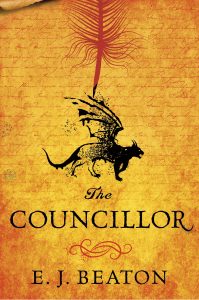
We asked E.J. for her thoughts on this intriguing cover!
The cover for The Councillor features a chimera being drawn in ink by a blood-encrusted quill. Writing covers the background, and the top-left corner is peeling back, suggeting that the page is being turned over. There are some ink splotches on the writing, and a flourish in red towards the bottom of the cover.
I was delighted when I saw this cover, designed by the talented Adam Auerbach. The elements included all hint at something important in the story. I’m a fan of minimalist book covers, because I like to imagine the characters and setting based upon the author’s language. This cover offers a minimalist homage to The Councillor. I’m pinching myself!
Welcome to the Hive E. J.!
First of all congratulations on your deal with DAW!
Thank you. And thanks to The Fantasy Hive for shining a light on women in SFF this month.
Your debut The Councillor will be released next year: could you tell us a little about it? What can we expect?
The Councillor follows the story of a palace scholar, Lysande, who becomes elevated to a leadership position. As Councillor, Lysande finds herself investigating the murder of her closest friend – the queen, Sarelin Brey – whilst choosing the next ruler from amongst the leaders of the cities. At the same time, an old enemy of the crown, the magic-wielding White Queen, is mounting a new attempt on the throne. Lysande has to put her intellectual skills to use in a new way, defending the realm and uncovering a traitor.
Hidden motivations and the difficulty of judging people come up in the novel. Lysande thinks she knows Sarelin, but the woman who was a friend to her might not have been so kind to others. There’s also an element about refashioning identity and coming to understand your own capabilities and desires – what happens when you have more power than you ever expected? What new chambers in your identity might you discover?
The relationship between Lysande and Prince Luca Fontaine is another part of the story. Lysande doesn’t trust Luca, but she’s drawn to him. They’re both very intelligent people from unconventional backgrounds, in a world where family blood is prized above all. There’s a natural connection between them – and a natural rivalry.
As this is your debut, can you tell us something about your writing progress, how you managed to score a place with Julie Crisp and how the road to publishing felt so far?
I studied literature and writing, and I wrote The Councillor as part of my PhD. After graduating, I researched the process of applying to agents and prepared my manuscript. Julie liked my opening chapters and asked to read the full novel. I felt that we were a good fit and chose her from amongst the agents who offered. I’m honoured that she took me on and championed my work.
As I navigated the early stages of the road to publication, reading blog posts and interviews by writers, agents, and publishers helped me to contextualise my progress and understand where I was at. Research gave me some data to make sense of the journey.
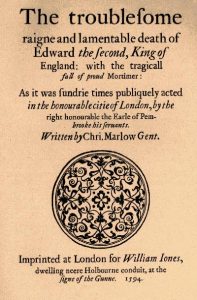 What inspired you to write The Councillor? Were there any specific moments, things or people who set the story off in your head?
What inspired you to write The Councillor? Were there any specific moments, things or people who set the story off in your head?
Writing the novel was an act of survival, for me – I reasoned that if I could represent the health struggles I was going through, I could get through one more day at a time. The best metaphor I could find for my experience was that my mind seemed to be under the control of a powerful enemy, and that enemy was invisible to most people around me. So I decided to write a story where the characters battle a queen who can control minds, a powerful woman who knows how to play a public image game.
A range of literary works inspired elements of The Councillor. I studied Renaissance literature and specialised in political works, and Machiavelli and Shakespeare were influences on me. Other authors of “mirrors for princes” treatises and writers such as Marlowe and Wyatt were of interest to me, too. I read quite a few histories of Renaissance Italy, and I studied French, so both of those things feed into The Councillor, as well.
In your upcoming world, men and women are socially equal – how hard was this to imagine and write it consistently? Were there any surprises for you?
It was a challenge, but it was also very rewarding. From the beginning, I imagined women in a range of different social roles – female military leaders, female intellectuals, female city-rulers, female merchants, female spies, female soldiers – and I tried to create the variety of jobs that I always enjoyed seeing in fantasy stories.
It was also interesting to consider how men might behave in this world. If men didn’t need to assert power over women in relationships, then how would they react to a woman who liked to take the lead? If male attractiveness wasn’t associated with physical strength, then what would it look like? If women weren’t shouldering the bulk of child-rearing duties, then might some fathers be stay-at-home parents in this world?
One of the biggest surprises was just how deeply patriarchal norms are embedded in our literary traditions. Even though I had set out to create a gender-equal world, I still had to weed out patriarchy from the novel as I edited and revised.
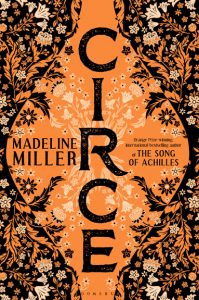 Since this is our Women in SFF month, who were the women in SFF (or beyond) that influenced or inspired you? (Authors and/or characters!)
Since this is our Women in SFF month, who were the women in SFF (or beyond) that influenced or inspired you? (Authors and/or characters!)
I’m inspired by authors who create complex stories about human identity, using rich and elegant language. Hilary Mantel does that so well in her Wolf Hall trilogy, exploring power and vulnerability. She takes a close look at people who wanted social mobility and the hierarchical system that they were up against. Madeline Miller is another writer who depicts power and identity with nuance – she gives characters from Greek myths and legends a very relatable humanity in Circe and The Song of Achilles. I love how both Mantel and Miller take characters who have typically been at the margins of the story and make them the protagonist.
In the fantasy and science fiction area, I’m drawn to N. K. Jemisin’s use of a strong literary voice and shifting perspectives in the Broken Earth trilogy. I love how skilfully Jemisin uses language to show the pain that people endure in the face of oppression. Her characters have such compelling, layered identities. I’m also inspired by Susanna Clarke’s Jonathan Strange & Mr. Norrell with its reimagining of history. Clarke uses language vividly – she can describe a gown as being “the colour of storms, shadows and rain”, or reference a fictional event with a footnote that seems entirely plausible.
Tell us a little something about you – what are your favourite things to do when you are not writing?
I’m the curator of my brother John’s photography and writing. John died at the age of 27, unexpectedly, and he inspired a great many people. My family and I exhibit and share his work so that new viewers and readers can discover it. He’s still a big part of our lives.
We’re so sorry to hear about your brother E.J, but what a beautiful way to keep his memory alive.
The arts are a passion for me – I love classical music, jazz, opera, theatre, and poetry, and I’m often at galleries enjoying visual art. My home city of Melbourne is always bursting with different art forms to stimulate thought.
What are your favourite mythological creatures? What would you ride gloriously into battle upon?
Hybrid creatures are fascinating. Creatures that combine the features of different animals offer such interesting metaphorical possibilities, because they can’t be easily defined. People are often uncomfortable with anything that doesn’t fit neatly into a category, but there’s something beautiful about hybridity.
Chimeras appeal to me as a woman who doesn’t fit into either the straight or gay categories. People often try to define bisexual or pansexual people by the relationships we’re in – but while relationships may contribute to our experience, our sexuality is something broader than that. In the same way, chimeras are recognisable by several distinct features within their form, but the chimera is a unique animal in itself, combining all of these elements yet becoming something more. Even the word chimera sounds dynamic to me.
Who are your favourite characters to write and why? What are your favourite kind of female characters to write?
I really enjoy writing about people who don’t quite fit into social norms. In The Councillor, I liked writing about characters who would have marginalised identities in our own world, but can be open with those aspects of their identity in this fictional world.
Lysande, the protagonist in The Councillor, keeps a lot of her thoughts unspoken. For that reason, it was fun to write her in scenes with other characters who are more outspoken – like Luca, who can be very provocative and isn’t afraid to be rude.
I don’t have a single kind of female character I like to write – what I enjoy is writing a range of different women, especially in a fantasy world where society can be restructured. It’s fun to write about a woman who’s very physically capable and has a lot of swagger. But it’s also fun to write about a female scholar, or a quiet assassin, or a black-market merchant: women with different personalities and different levels of privilege. When you see those characters interacting, you get a glimpse of how they see each other, too.
If there was a time you could travel back to, when would it be?
Despite the fascination I have with history, I wouldn’t like to travel back to any era of the distant past, given the circumstances for women, queer people, and those who suffered racial discrimination, persecution, or slavery. Working-class men didn’t have an enviable life, either, and even the rich lacked the medical advances we have today. As bad as 2020 seems, the 1400s weren’t exactly idyllic!
If I could choose any time to revisit from my own life, I’d relive my experiences with my brother – not only the big ones, like the holidays we shared, but all the little conversations and the time spent in a lowkey way. When someone close to you dies, those memories become extremely precious.
During these current uncertain times, have you found yourself with more time to write or less? Did it help as writing motivation, or was it more of a hindrance?
Our summer of fires in Australia was devastating in a deep and lasting way. Seeing huge swathes of your country burn and knowing that those conditions will not go away… it’s a new kind of existential threat, beyond the usual bushfires. Like many Australians, I’m still grappling with the enormity of the crisis.
We’ve been fortunate to avoid the worst-case scenario with COVID-19 in Australia. Despite that, the effects of the pandemic have still thrown a lot of chaos into work routines. I hope that those who are enduring much worse outbreaks can find some hope to sustain themselves throughout this strenuous year.
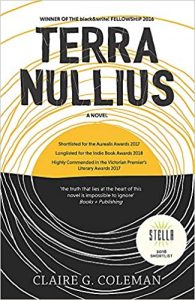 Do you have a favourite SFF that’s underrated? What’s your favourite book recommendation?
Do you have a favourite SFF that’s underrated? What’s your favourite book recommendation?
Claire G. Coleman’s Terra Nullius was shortlisted for the Stella Prize here, and it’s next on my list to read. It’s a speculative reimagining of colonial history. Outside of sci-fi and fantasy, First Nations writers Alexis Wright, Melissa Lucashenko, and Tara June Winch have all established themselves as literary forces.
I have to also recommend Marlon James’ prize-winning novel, A Brief History of Seven Killings, which blends many characters’ perspectives in a polyphonic story.
Finally, what’s the one thing you hope readers take away from your stories?
Hopefully, an enjoyment of the language. Perhaps some reflection on power, in its multifarious forms, and the marks it leaves. And if I’m lucky, a connection to the characters.
Ultimately, though, I’d be honoured if readers find their own unique connection with my work.
Thank you so much for joining us today, E. J. Good luck with your debut!
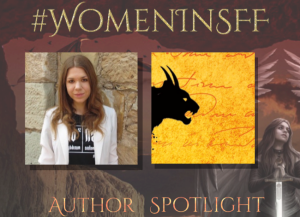

[…] E. J. Beaton’s debut novel piqued my interest with the description “Machiavellian fantasy,” and I was only more intrigued by it after learning more about how the author’s study of Renaissance literature was a major influence in this interview at The Fantasy Hive. […]